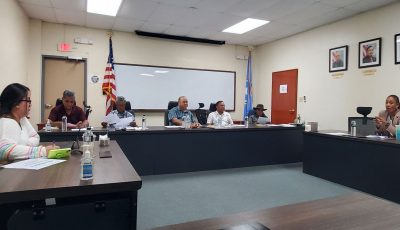The plight of IPI’s stranded guest workers
Editor’s Note: The following is the text of a letter that Rep. Edwin K. Propst (Ind-Saipan) wrote Commonwealth Casino Commission executive director Andrew Yeom.
I want to thank you and your Commonwealth Casino Commission team for joining our House Gaming Committee meeting last week Thursday, Jan. 28. We appreciate you answering our questions and concerns. We also appreciate that you were able to hear from IPI’s stranded guest workers, several of whom shared their hardships and struggles with no income, no payments for what they are owed, and several living without power and water.
A few of my colleagues and I have been meeting with these workers since our last meeting, and I want you to know that these workers are being given plane tickets by IPI to leave the CNMI by Feb. 8. While they do want to return to their home countries, they do not want to leave without getting paid what they are owed. How can they leave the CNMI with empty pockets, without being paid? Is this fair? Is this legal? Is this humane?
The last group of guest workers from IPI who left back in September and October of 2020 were promised they would get paid what they were owed. To date, they have not received a penny. If these guest workers leave in a few days without getting paid, they are likely to suffer the same fate.
When IPI hired these guest workers under the CW-1 program, IPI agreed that it will “abide by the following conditions with respect to its CW-1 workers and any workers in corresponding employment.”
Included in these conditions that IPI must abide by is “20 CFR § 655.423 – Assurances and obligations of CW-1 employers.” As you likely already know, “CFR” is abbreviated and stands for the Code of Federal Regulations, which is the codification of the general and permanent rules published in the Federal Register by the executive departments and agencies of the federal government. This is a binding set of federal rules and regulations that cannot be willfully ignored. Yet somehow IPI has done so, and will continue to do so, unless the CCC, along with the U.S. Department of Labor and the CNMI Department of Labor, ensures they follow and adhere to these CW-1 rules and regulations. If they do not, then they jeopardize the entire CW-1 program for the Commonwealth. Is this fair to other companies who have followed all CW-1 rules and regulations?
Under 20 CFR § 655.423 (f), “The employer must guarantee to offer the worker employment for a total number of work hours equal to at least three-fourths of the workdays of the total period of employment specified in the work contract, beginning with the first workday after the arrival of the worker at the place of employment or the advertised contractual first date of need, whichever is later, and ending on the expiration date specified in the work contract or in its extensions, if any.”
Under 20 CFR § 655.423 (g), “Impossibility of fulfillment. If before the expiration date specified in the work contract the services of the worker are no longer required for reasons beyond the control of the employer due to fire, weather, or other Act of God, or similar unforeseeable man-made catastrophic event (such as an oil spill or controlled flooding) that is wholly outside the employer’s control that makes the fulfillment of the work contract impossible, the employer may terminate the work contract with the approval of the CO. In the event of such termination, the employer must fulfill a three-fourths guarantee, as described in paragraph (f) of this section, for the time that has elapsed from the start date listed in the work contract or the first workday after the arrival of the worker at the place of employment, whichever is later, to the time of its termination. The employer must make efforts to transfer the CW-1 worker or worker in corresponding employment to other comparable employment acceptable to the worker and consistent with immigration laws, as applicable. If a transfer is not affected, the employer must return the worker, at the employer’s expense, to the place from which the worker (disregarding intervening employment) came to work for the employer, or transport the worker to the worker’s next certified CW-1 employer, whichever the worker prefers.”
In layman terms, IPI must pay its guest workers the “three-fourths guarantee” as stipulated in the CW-1 agreement. While IPI executives and their attorneys may ask whether or not this was in their actual contract, this should not matter, as this was a rule under the CW-1 program. Are they CW-1 workers? Yes. Did IPI agree to these rules and regulations when they hired them? Yes. Should they be paid what they are owed based on the three-fourths guarantee? Yes.
If these workers are sent home on Feb. 8 without being paid their three-fourths guarantee, then I will be calling for another Gaming Committee meeting and will request for your presence, along with your CCC team, CCC chair Edward Deleon Guerrero and the CCC Commissioners, the U.S. Department of Labor, and the CNMI Department of Labor for an explanation to our Gaming Committee as to why the CW-1 rules and regulations can so easily be ignored.
Guest workers in our Commonwealth should be treated with the dignity and respect they deserve, to be treated like family. This is our island way.
Director Yeom, we would like to see the casino industry not only survive on Saipan, but live up to its promises, which include a $7 billion investment. But it cannot do so when IPI cannot even pay its workers what they are owed. Before any further construction should continue, before any work moves forward, let us see to it that their workers are paid, and all vendors are paid. Then, and only then, can we have a serious discussion about the future of our casino industry on Saipan.
Thank you for your time and I look forward to hearing from you.
Edwin K. Propst (Special to the Saipan Tribune)
Rep. Edwin K. Propst is chairman of the House Committee on Gaming in the 22nd Commonwealth Legislature.



























